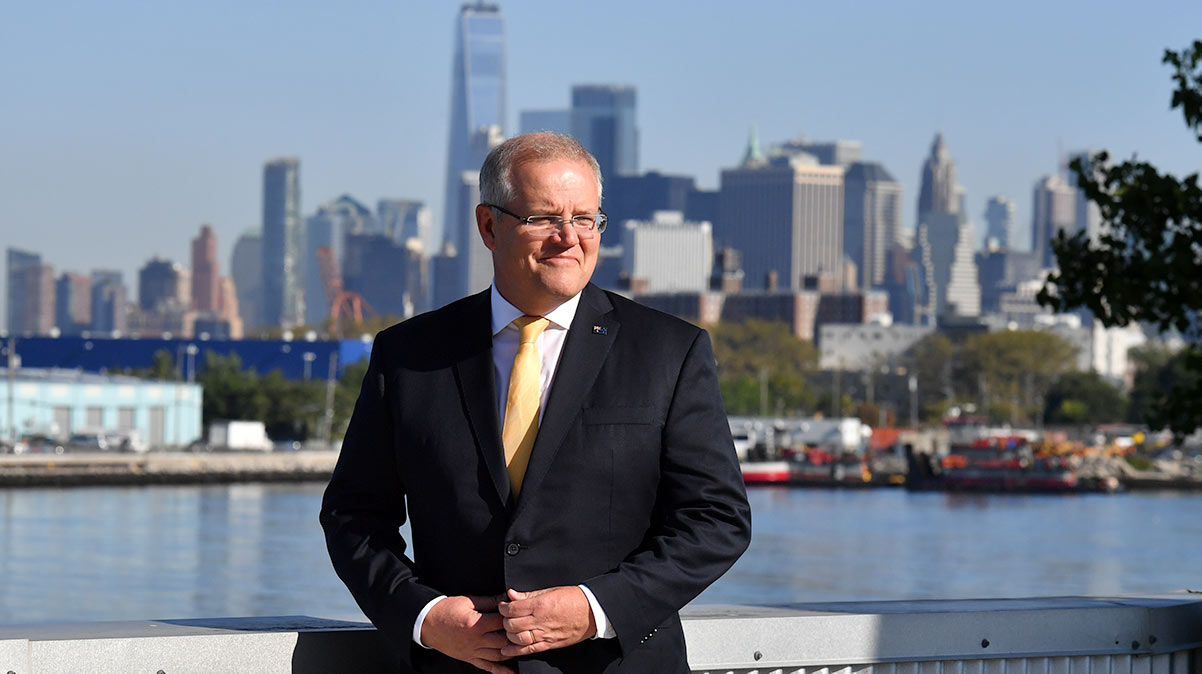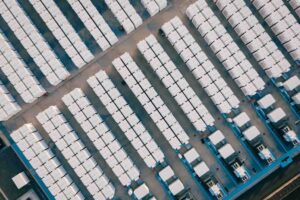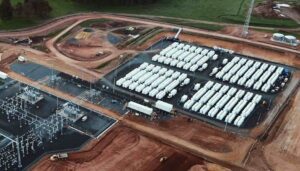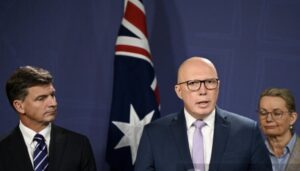Scott Morrison has landed in New York for a week of meeting with international leaders, but the prime minister is likely to spend the time trying to mend damaged diplomatic relationships rather than engaging with other world leaders on climate issues.
World leaders are convening in New York this week for the next session of the UN General Assembly, which will largely be focused on the ongoing response to the Covid pandemic, fostering economic recovery, and preparations for the next round of climate change negotiations that will be held in Glasgow in a few weeks’ time.
Several critical meetings have already been held, including a call from the UN for leaders to “stop ignoring the science.” But, like his last visit to New York, when Morrison avoided a climate leaders summit meeting in favour of a state dinner with Donald Trump, he has other priorities.
Morrison’s major focus now will be dealing with the ongoing fallout from the cancellation of Australia’s submarine deal with France. This self-inflicted blunder has seen relations sour with the broader European community while implicating allies the United States and the United Kingdom, and possibly putting a climate deal with China at risk.
The mishandling of that deal means Morrison arrives in New York with a new level of unpopularity amongst world leaders, and needing to navigate a frosty diplomatic relationship with European leaders threatening to scuttle a free-trade agreement between Australia and the EU that has been years in the making.
Morrison will meet with leaders from Sweden and Austria and European Commission president Ursula von der Leyen, who has already described Australia’s treatment of France as “unacceptable”.
The European leaders could look to punish Australia on two fronts – to send a message over the cancelled $90 billion submarine deal, as well as following through with the introduction of export tariffs on Australia’s carbon intensive exports, to account for Australia’s virtually non-existent price on carbon pollution.
While in the US, Morrison will meet with other leaders of the “quad” strategic dialogue, which includes US president Joe Biden, Japanese prime minister Yoshihide Suga and Indian prime minister Narendra Modi to discuss regional security measures.
However, it is unlikely that Morrison will engage in any discussions that relate to climate change policy – with Australia already on the outer of international talks due to a refusal to adopt stronger climate change targets.
Morrison is not listed to address the UN General Assembly, and Australia was not invited to participate in a climate change roundtable convened by UN secretary-general António Guterres and UK prime minister Boris Johnson.
That meeting, held on Monday, was attended by the heads of state of a “representative” group of countries, including Germany, France, Italy and Fiji and the Marshall Islands – amongst others.
Senior representatives from the European Union, China, India, Russia and the United States also attended the roundtable, with all attendees agreeing that achieving the goals of the Paris Agreement, including endeavours to limit global warming to just 1.5 degrees, remained a priority.
Guterres used the roundtable to call on countries to strengthen their emissions reduction targets, particularly those for 2030, pointing to a recent report from the UNFCCC that found the current level of commitments would see global warming surge past 2 degrees.
“Based on the present commitments of Member States, the world is on a catastrophic pathway to 2.7-degrees of heating, instead of 1.5 we all agreed should be the limit,” Guterres said.
“Science tells us that anything above 1.5 degrees would be a disaster. To limit temperature rise to 1.5 degrees, we need a 45 per cent cut in emissions by 2030, so we can reach carbon neutrality by mid-century.”
Guterres added a call for the phase out of the use of coal.
“Governments must shift subsidies away from fossil fuels and progressively phase out coal use,” Guterres said.
“If all planned coal power plants become operational, we will not only be clearly above 1.5 degrees – we will be well above 2 degrees. The Paris targets would go up in smoke.”
UK prime minister Boris Johnson used the roundtable to call on wealthier countries to increase their commitments to climate finance. Johnson said that rich nations needed to fulfil a pledge to ‘mobilise’ $US100 billion a year to support developing countries grow their economics while also achieving a target of zero net emissions.
“These countries need allies,” Johnson told the roundtable. “They need help now. That’s why I stress the $100 billion so much.
“To be merely a bystander is to be complicit in their fate – yet that is exactly what you will be if you fail to act this year.
“And when the summit ends, when most of the world has committed to decisive, game-changing action, it will be clear to all which of us has lacked the courage to step up. The world will see, and your people will remember, and history will judge,” Johnson added.
An assessment of climate finance commitments recently published by Oxfam found that many wealthy countries – including Australia – are failing to meet the level of commitments needed to meet the $100 billion a year target adopted by countries at the 2010 climate talks held in Cancun.
“The pandemic has shown that countries can swiftly mobilise trillions of dollars to respond to an emergency — it is clearly a question of political will,” Oxfam Australia chief executive Lyn Morgain said. “Let’s be clear, we are in a climate emergency. It is wreaking havoc across the globe and requires the same decisiveness and urgency.
“Wealthy nations must live up to their promise made 12 years ago and put their money where their mouths are. We need to see real funding increases now.”










